Showing 1-20 of 116 results
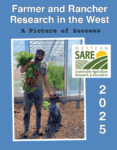
Farmer-Rancher Research in the West
Making changes on the farm or ranch involves taking risks. One or two years spent experimenting can lead to a financial hit too difficult to recover from. That’s where Western SARE’s Farmer/Rancher and Professional + Producer grants help out. Grantees, like the ones highlighted in this report, come up with the possible solution to a […]
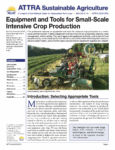
Equipment and Tools for Small-Scale Intensive Crop Production Guide and Videos
This publication focuses on equipment and tools for intensive crop production on a small-scale commercial farm. It details equipment and hand tools for soil preparation, planting, weed management, and harvesting. The use of appropriate equipment and tools, both in terms of size and practicality, can increase production efficiency and profits while minimizing disturbance to soil […]
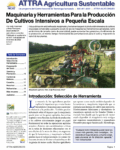
Maquinaria y Herramientas Para la Producción De Cultivos Intensivos a Pequeña Escala
Resumen Esta publicación se centra en equipos y herramientas para la producción intensiva de cultivos en una granja comercial a pequeña escala. Detalla equipos y herramientas manuales para la preparación del suelo, la siembra, el manejo de malezas y la cosecha. El uso de equipos y herramientas apropiados, tanto en términos de tamaño como de […]

Landmapper
Landmapper is an open-source app that was created by Ecotrust to provide basic property summaries and maps involved with the preparation of forest stewardship plans. Landmapper How-To Video This short video walks potential users of Landmapper through the process of selecting a parcel within Oregon or Washington and creating a series of maps to help […]

Business Tools for Ag Video Series
This seven-part video series was produced by Utah's Master Stockman Consulting to teach new and beginning producers about valuable tools for making economically sustainable decisions. This includes discussion of basic economic principles and tools, as well as how to conduct on-farm research and apply existing research to your operation. Basic Farm and Ranch Economics This […]
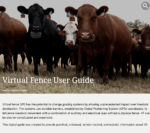
Virtual Fence User Guide
The virtual fence webpage on Rangelands Gateway allows potential users to access resources, tools, workshop materials, webinar information, and multimedia resources. Virtual fencing (VF) has the potential to change grazing systems by allowing unprecedented impact over livestock distribution. The systems use invisible barriers, established by GPS coordinates, to influence livestock movement with a combination of […]

Soil Invertebrates as Bioindicators Pocket Guide and Soil Life Website
Informative pocket guide explaining the importance and identification of soil invertebrates. Soil Life Website Informational webpage serving as a centralized location for Soil Life topics.
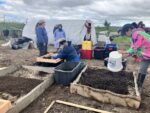
Training Ag Leaders in the Bering Strait
A large nonprofit with a long history in Alaska, the Rural Alaska Community Action Program (CAP) is well-known for its work addressing housing, workforce development, and health challenges. When COVID hit, the organization added food security work to their priorities. With the Coronavirus Aid, Relief, and Economic Security (CARES) Act funding, they initiated ten food […]
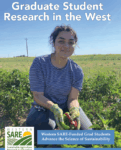
Graduate Student Research in the West
The Western SARE Graduate Student program invests in graduate students to conduct innovative research and outreach for advancing sustainable agriculture knowledge and practices in the West. This grant program provides graduate students the opportunity to conduct research and outreach alongside producers and educators to prepare students to understand the challenges and nuances of agricultural production. […]
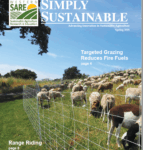
Simply Sustainable Spring 2025
Western SARE's Bi-Annual Magazine
Funded Projects
At their March 2025 meeting, the Administrative Council approved funding for 86 projects. The total amount of funding is over $7.9 million. Projects were funded in 14 states and territories. Funding included:

How to Get Your Message Out
This Online Communication Roadmap for Rangeland Professionals by the University of Arizona will help improve your skills and knowledge of online communication by outlining key strategies for communicating your rangeland or natural resources work to the right audiences. The authors suggestion you consider this the communication roadmap for when you want people to read a […]
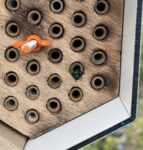
Can Introducing Mason Bees Boost Berry Pollination?
When it comes to berry pollination throughout the West, honeybees are the biggest show in town. That can be a problem for pollination diversity and for farmers because honeybees aren’t always the best option for some crops. “That’s especially true with blueberries,” said Miranda Jones, a graduate student in biology at Utah State University. “Blueberries […]

The Terroir of Bison
Is Grass-Fed Bison Better for your Health? Not all bison burgers are created equal. As with other livestock, it stands to reason that how and where bison are raised would impact the meat’s nutritional profile. But there isn’t much science on how different forages and finishing strategies effect bison quality. Until now. Nutrition science […]
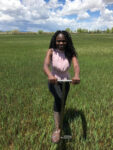
Biofertilizers in High Elevation Meadows
Livestock producers in the high elevation areas of Wyoming and Colorado depend on hay meadows for their forage production. Because of limited precipitation and low fertility, producers have routinely practiced flood irrigation in these meadows and apply high rates of nitrogen fertilizer to guarantee sufficient production. Yet, these integral meadows are underperforming, expensive to manage, […]

From Vertical Farms to Outer Space
Research projects can at times lead to unanticipated results. While working to identify an alternative and sustainable source of carbon dioxide (CO2) generation for enriching plant chambers within the growing vertical farming industry as a graduate student at the University of Arizona, Justin Chung discovered the potential benefits for sustaining astronauts in long duration missions. […]
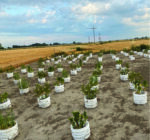
Idaho Student Researchers Work to Eradicate Pale Cyst Nematode
When the pale cyst nematode, Globodera pallida, was discovered in southeastern Idaho in 2006, potato exports in Idaho and the United States were severely impacted. The nematode, which can devastate a potato crop, is a quarantine pest regulated by U.S. Department of Agriculture’s Animal and Plant Health Inspection Service. The Idaho infestation is found within […]
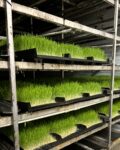
Grow Your Own: Testing the Benefits and Economics of Feeding Sprouted Grains
A few wet winters haven’t dimmed memories of the severe drought Utah cattle producers – and producers around the West – lived through over several years. “A whole bunch of producers had to downsize their herds because there wasn’t pasture for their cattle and hay was so expensive,” said Kara Thornton-Kurth, an associate professor in […]
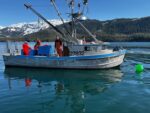
Can Kelp be Alaska’s New Agricultural Frontier?
Alaska is relatively new to the business of farming kelp, a type of seaweed gaining popularity across the globe because it’s healthy for humans and good for the planet, too. Kelp is rich in vitamins, minerals and protein, requires no soil or fertilizers to grow, provides habitat for fish, and balances ocean acidification caused by […]
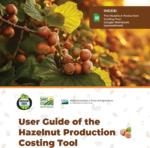
User Guide of the Hazelnut Production Costing Tool
Hazelnut growers can use this tool to estimate their costs of production. This information by Oregon Tilth can be used to help growers better understand their cost structure and explore how changes to production practices, yields and price will impact net returns and long-term viability. The link to the tool is included in the guide.